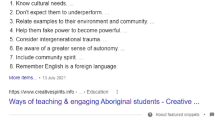Abstract
The debate about Islam and science extends to a debate about the relationship between Islam and science education. In this paper, I explore Egyptian teachers’ views of the relationship between science and religion within the Islamic context. Teachers’ key vision of the relationship between science and religion was that “religion comes first and science comes next. I will argue that teachers’ personal religious beliefs are among the major constructs that drive teachers’ ways of thinking and interpretation of scientific issues related with religion. Then, I discuss how teachers’ personal religious beliefs have been formed and influenced their pedagogical beliefs related to science and religion issues. Finally, I will argue, how we use the personal religious beliefs model as a framework of teaching/learning scientific issues related with religion within sociocultural (Islamic) context. 




Similar content being viewed by others
References
Ball-Rokeach, S., Rokeach, M., & Grube, J. (1984). The great American values test. New York: Free Press.
Dadds, M. (1995). Passionate enquiry and school development: A story about teacher action research. London: Falmer Press.
Dagher, Z., & BouJaoude, S. (1997). Scientific views and religious beliefs of college students: The case of biological evolution. Journal of Research in Science Teaching, 34, 429–445.
Kamali, M. (2003). Islam, rationality and science. Islam and Science, 1.
Knowles, J. G. (1992). Models for understanding pre-service and beginning teachers’ biographies: Illustration from case studies. In I. F. Goodson (Ed.), Studying teachers’ lives (pp. 99–152). London: Routledge.
McIntosh, N. (1995). Religion-as-schema, with implication for the relation between religion and coping. The International Journal for the Psychology of Religion, 5, 1–16.
Reiss, M. J. (1993). Science education for a pluralist society. Buckingham: Open University Press.
Reiss, M. J. (2004). What is science? Teaching science in secondary schools. In E. Scanlon, P. Murphy, J. Thomas, & E. Whitelegg (Eds.), Reconsidering science learning (pp. 3–12). London: RoutledgeFalmer.
Stanley, W., & Brickhouse, N. (2001). Teaching sciences: The multicultural question revisited. Science Education, 85, 35–49.
Author information
Authors and Affiliations
Corresponding author
Rights and permissions
About this article
Cite this article
Mansour, N. Science teachers’ interpretations of Islamic culture related to science education versus the Islamic epistemology and ontology of science. Cult Stud of Sci Educ 5, 127–140 (2010). https://doi.org/10.1007/s11422-009-9214-5
Received:
Accepted:
Published:
Issue Date:
DOI: https://doi.org/10.1007/s11422-009-9214-5




